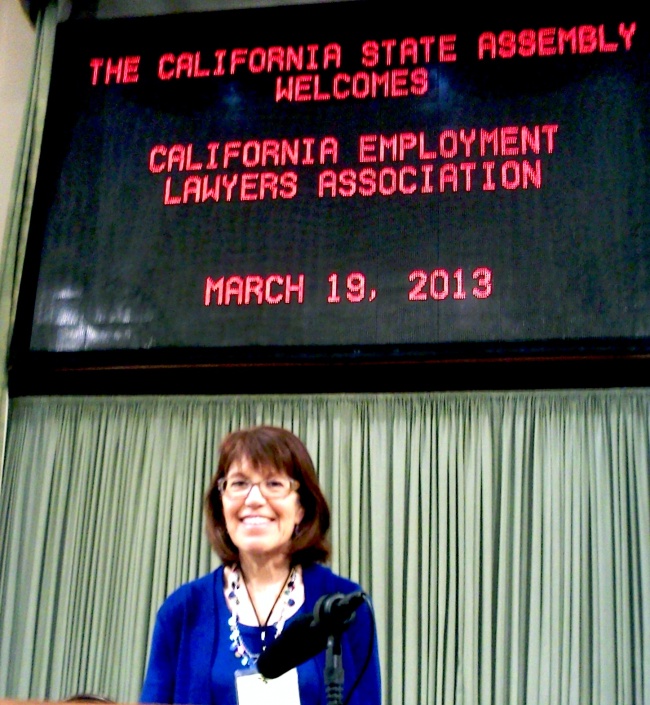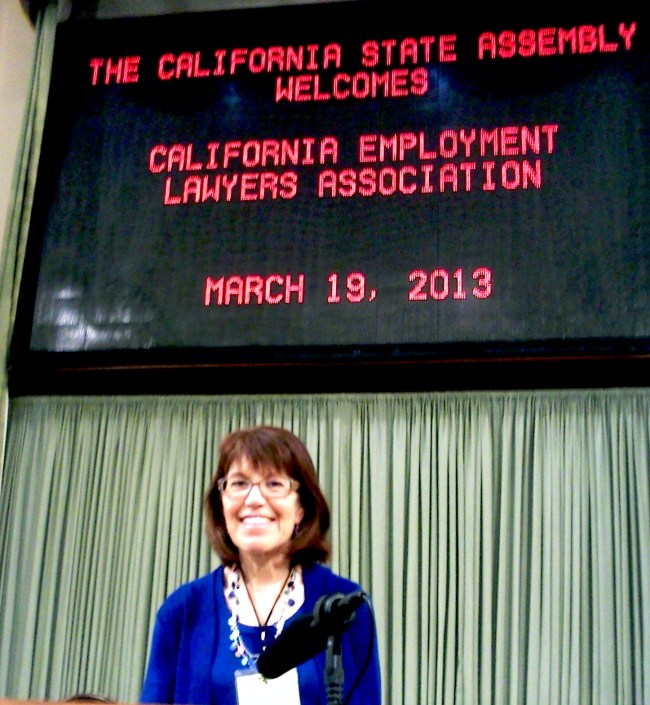
English: Seal of the Senate of California (Photo credit: Wikipedia)
 In March, I blogged about three bills which clarify, simplify or fix existing employment laws. They were introduced into our State Senate and sponsored by a wonderful organization of which I am proud to be a member: the California Employment Lawyers Association (CELA). CELA attorneys represent millions of California employees who want to work, free of unlawful discrimination and be paid their earned wages.
In March, I blogged about three bills which clarify, simplify or fix existing employment laws. They were introduced into our State Senate and sponsored by a wonderful organization of which I am proud to be a member: the California Employment Lawyers Association (CELA). CELA attorneys represent millions of California employees who want to work, free of unlawful discrimination and be paid their earned wages.
I promised to update the progress of these bills.
So–here is the latest on them:
SB 292: (Author: Senator Ellen Corbett) Sexual Harassment:
Update as of August 13, 2013:Governor Brown signed the bill into law on Monday, August 12, 2013. Yay!
This bill clarifies. The Fair Employment and Housing Act (“FEHA”), does not require a sexual harassment victim to prove that his or her same sex harasser was motivated by sexual desire for the victim. It arose from a terrible appellate court decision, Kelley v. The Conco Companies (1st Dist 2011), 196 Cal. App. 4th 191 which held that in a case of male to male sexual harassment, to survive a motion a motion for summary judgment, the plaintiff must prove the harasser sexually desired the plaintiff, despite a showing of sexually explicit and offensive acts of harassment, including threats of sexual violence. Read the bill here:
This bill makes it clear. Sexual harassment is all about unequal power in the workplace and using sex as a weapon to create a hostile work environment. Sexual desire has nothing to do with it. This was the pre-Kelley status quo under the Federal Title VII (42 U.S. C §2000e et seq.) and California’s FEHA (Gov. Code §12900 et seq.)
The bill puts same sex and heterosexual harassment victims on an equal footing. It eliminates Kelley’s double standard and its Pandora’s boxes which required probing into alleged same sex harassers’ sexual preferences and sexual history in depositions in order to discern their sexual desire for their victims. It also ends the same sex harasser’s loophole for avoiding liability, even in egregious cases i.e., (“I wasn’t attracted to the employee I tormented”). Thanks, elected officials for your common sense in legislatively overruling a terrible court case!
Here is more detail on how it got to the Governor:
– April 22, 2013: the bill passed the Senate and was sent to the Assembly
-July 3, 2013: the bill passed the Assembly, Happy Independence Day!
-August 6, 2013: the bill was enrolled and presented to the Governor for his signature.
SB 404 (Author: Senator Hannah-Beth Jackson) Banning Family Hostile Workplace Stigmatization for family care giving duties:
Update as of August 13, 2013:
The bill passed the Senate on May 29, 2013 and was sent to the Assembly where it made the rounds of a number of appropriate committees. July 3, 2013 it was amended, read for a second time before the Assembly and sent back for a second time to the Appropriations Committee, its present resting place.
This family-friendly bill addresses discrimination based on out-dated stereotypes and unfounded assumptions about family care giving for workers who care for a grandparent, parent, parent- in-law, sibling, spouse, domestic partner, child or grandchild. It does not require employers to accommodate family care giving, it just bans discrimination based on assumptions or stereotypes about those who do care for a family member. It does this by including “familial status” in the list of characteristics protected from employment discrimination under FEHA. Here is the latest amended version of the bill:
This bill will: 1) help employers know when they need to take steps to stop this form of discrimination, 2) protect workers with family care giving responsibilities and 3) promote family friendliness, which should make California workplaces more attractive to the best talent and more productive.
Some examples of banned stereotyping include: 1. a single dad firefighter denied a promotion and given a negative performance review because he spent his flex time taking care of his children instead of playing golf like his male colleagues; 2. a mother with young children denied the option to vie for a promotion which requires overnight travel because it is assumed she would not want to be away from her children overnight.
This bill is needed because growing numbers of workers have care giving responsibilities for their children, siblings, disabled spouses, domestic partners or elderly parents and find themselves unfairly stigmatized and denied workplace fairness by family-hostile attitudes and behaviors.
In 2007 and 2009 the Federal Equal Employment Enforcement Commission (“EEOC”) issued Enforcement Guidance on familial status discrimination, finding that it is often difficult to remedy using traditional gender discrimination laws. It is sometimes referred to as “sex plus” discrimination because if affects a subset of women or men who are pregnant or have family care giving responsibilities.
California needs to catch up to other states and local entities which ban familial status discrimination. Let your state legislators know your views on this important change to the law.
SB 462 (Author: Senator Bill Monning): Conforming Attorneys’ Fees in unpaid wage cases so the winning employer must show the losing employee’s bad faith to recover attorneys’ fees :
Update as of August 13, 2013:
The bill was passed by the Senate on May 29, 2013, cleared the Assembly on Monday, August 12th and will be heading to the Governor for his signature. Cross your fingers he signs it!
This bill fixes an anomaly with attorneys’ fees awards for wage and hour actions under Labor Code §218.5. Right now if a California employee loses his/her action to recover unpaid wages or benefits, she or he could be liable for the winning employer’s attorneys’ fees. This is because Labor Code §218.5 provides for attorneys’ fees to the “prevailing party”, which includes the prevailing employer. This law ignores that in many if not most cases, the wealth gap between employer and employee means the employer is far more able to pay attorneys’ fees.
In my practice I have seen the chilling effect the risk of having to pay a $500+/hour attorneys’ fee bill has on a wage earner earning a fraction of that who decides the risk is too big to take, so abandons a valid wage claim. Law abiding employers who pay their employees their earned wages suffer, too since this law creates a competitive disadvantage for them relative to those who unlawfully withhold earned wages from workers too scared to hold them accountable.
This bill would bring this outlier attorneys’ fee statute into conformity with Federal law and the rest of the Labor Code (which except for one other fee award statute) only allows a prevailing employee to recover attorneys’ fees, absent a finding of “bad faith” by the employee bringing the wage claim. Since this has long been the norm with most other fee award statutes, there is lots of authority on what is “bad faith”.
It is embarrassing that only California, Oklahoma and Florida maintain this outlier position when it comes to awarding attorneys’ fees to the prevailing party in wage claims.
California needs to get with it! You can read the bill’s full text here:
In a future blog I will let you know what the Governor does with it and what happens to SB 404 (“familial status” protected against workplace discrimination).
Marjorie Wallace is a California licensed employment lawyer. The information contained in this blog is for educational purposes only and does not create an attorney-client relationship between the writer and any reader or constitute legal advice to anyone reading it.
38.019366
-122.134132













